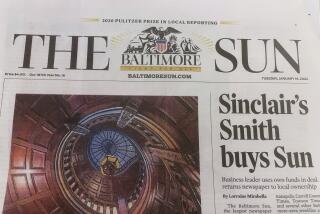Amid Junk Bond Woes, Ingersoll Sells Stake in 3 Newspaper Chains
- Share via
Publisher Ralph Ingersoll II agreed Monday to sell his stake in three debt-laden North American newspaper chains and acquire full ownership of a smaller European publishing company after one of his U.S. properties failed to make an interest payment on its junk bonds.
Ingersoll, who built one of the nation’s largest newspaper chains with money raised by junk bond wizard Michael Milken, will sell his share in the U.S. companies to partner E. M. Warburg, Pincus & Co., a New York investment firm. In return, Ingersoll will gain total ownership of another Warburg-Ingersoll partnership that owns several European newspapers.
“We were, from a philosophical point of view, growing apart,” Ingersoll said of his relationship with Warburg. “I wanted to do more overseas, and they wanted to do more here.”
Despite Ingersoll’s denials, many Wall Street analysts and bondholders said the deal was related to the financial troubles at Community Newspapers Inc., one of the companies involved in the swap. The company, which owns newspapers in Ohio and New York, said it would not make a July 1 semiannual interest payment on $125 million worth of high-risk, high-yield junk bonds.
“The market has for a long time questioned Mr. Ingersoll’s ability or willingness to make the July 1 interest payment, insomuch as the bonds have been trading at huge discounts for quite a while,” said Joseph Bencivenga, who heads high-yield bond research at the New York investment firm Salomon Bros.
Ingersoll’s woes are the latest addition to a growing list of troubles suffered by entrepreneurs and companies financed with junk bonds. In the past year, the roster of prominent junk bond issuers that have fallen victim to heavy debt loads includes Canadian financier Robert Campeau’s retail operations; RJR Nabisco, and, most recently, one of developer Donald J. Trump’s casinos in Atlantic City, N.J.
Like many companies around the country, Ingersoll’s privately held Community Newspapers has been squeezed financially from two sides: a general decline in advertising revenue and the slumping junk bond market, analysts said.
Depressed advertising revenue from its New York papers made it tough for Community Newspaper to come up with the cash to pay bondholders. In 1989, the cash generated by the chain reportedly fell $30.5 million short of what was needed to meet interest payments.
Meanwhile, the value of Community Newspaper’s junk bonds have sunk so low that it faced the prospect of boosting its interest payment as required under the “reset” feature of the bond issue. The reset was to have taken place July 7, but the company says that “will not be possible.”
“Nobody in their wildest dreams could have ever imagined that (reset bonds) could create these problems,” Ingersoll said. “They turned out to be time bombs if the market becomes illiquid.”
The missed interest payment heightens tensions with bondholders, who could force the company into involuntary bankruptcy if no interest payments are made within 30 days and the company is then officially in default on the bonds. Ingersoll had already angered investors by offering to buy back the bonds at a steep discount.
“Most bondholders felt there was more value in the assets than what they were being offered,” said high-yield bond analyst Bob Kricheff at the New York investment firm First Boston.
Warburg will now be left alone to deal with the bondholders, analysts said. “One could argue it’s a ploy to buy back the bonds cheaply,” one analyst said of the deal between Ingersoll and Warburg. “The next step is negotiations with bondholders to come up with a cash payment.”
As part of the agreement, Warburg receives total ownership of Ingersoll Newspapers Inc., which publishes nine dailies and 53 weeklies; New Haven Acquisition Co., which publishes the New Haven Register in Connecticut, and Community Newspapers.
Ingersoll, whose father founded a newspaper management company, will end up owning a group of British and Irish newspapers, a magazine publisher and a trade show company. The looming economic unification of Western Europe will “create a once-in-a-lifetime opportunity,” he said.
More to Read
Inside the business of entertainment
The Wide Shot brings you news, analysis and insights on everything from streaming wars to production — and what it all means for the future.
You may occasionally receive promotional content from the Los Angeles Times.










